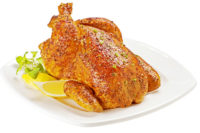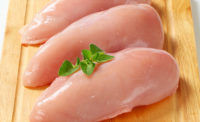The veal sector needs to give people a reason to be interested in eating veal again, enjoying the product without a guilty conscience, according to Tim and Randy Strauss, the co-presidents of Strauss Brands, located in Franklin, Wis. Last December, the company became the first veal company in the nation to raise all of its special-fed veal calves in a 100% tether-free and group environment.
“As of December 23, 2008, we were officially out of the crate-raised veal business. It was a day of celebration,” said Randy Strauss. “Our family had been working to achieve this goal for over seven years, and the last six months were the most intense with many of our growers converting barns and then learning how to raise veal calves in a tether-free environment. Even though industry experts and scientists had told us that we were raising these calves in the best possible way, our personal beliefs told us there was a more kind and compassionate method of raising our livestock,” he added.
Strauss Brands has been a strong supporter of special-fed veal since 1937, when Milton Strauss and his brothers first started Strauss Brothers Packing. Today, Randy and Tim take that family legacy to heart. Their passion for supporting the independent veal grower and special-fed veal industry remains as strong as ever, but they realize that they can’t expect today’s consumer to buy grandpa’s veal.
“As an industry, we have a huge challenge and opportunity in front of us,” said Tim Strauss. “For 30 years, consumers have been asking us to improve the way we raise veal calves. They have asked us to find ways that are more humane and more acceptable to their consciences, so they can feel good about eating veal. When the industry resisted making the change, our consumers quietly disappeared. Today, we have the chance to win them back, but we have to begin with education and positive outreach.”
Despite the economy, the brothers are very enthusiastic about the response they have received from their customers and consumers this year. They earned unprecedented support from the national media. Food editors, writers at national magazines and even TV stars like Oprah Winfrey have touted the Strauss Brands story.
“This is the first step to bringing customers back to veal. Next, we have to teach a generation of consumers how to cook a product they have essentially boycotted for 30 years,” Tim explained. To do that, Strauss Brands has invested heavily in rebranding and developing educational marketing pieces. Pre-printed, case-ready film and in-store point of sale materials tell the story of the company’s commitment to tether-free and group raising standards, and they also give quick and easy preparation tips.
Good for consumers, good for the calves
The Strauss family believes in supporting independent, family growers. They do not own or raise any of their own calves. With some supplier relationships spanning over 20 years, they received a lot of great feedback during the transition time.“The best news we heard after the transition was how much healthier the calves were in the barns. Overall, growers have reported dramatically lower medication usage as a result of reducing the stress on our calves.” The brothers acknowledged that there have been rough patches and learning curves. Some growers took a little more time than expected to get feed conversions back on track, and the calves need to be tended to more – sorted for size and temperament.
Last year, the Strauss family also launched a new niche line, Strauss Free Raised. The line has generated a tremendous amount of press. The brothers say this is the result of their unique product and their adherence to authentic pasture-raising methods, such as using no antibiotics, a diet of mother’s milk and pasture grass and allowing calves to enjoy a free-range lifestyle. They also utilize a different genetic base – Limousin calves.
“To achieve our goals, we had to re-think everything,” said Randy Strauss. Randy and Tim teamed up with renowned animal welfare experts to develop the raising system that is the foundation for their Free Raised veal program.
Their goal was to raise calves in the manner used for centuries. The family wanted to recreate that dining experience for today’s consumers. While they still have a niche product line, Randy and Tim said they are very pleased with the results they have seen so far. The product’s attributes, such as having less saturated fat, cholesterol and sodium than a boneless, skinless chicken breast, have been a draw for new consumers.
There is a distinct color difference of Strauss Free Raised veal, as the pasture-raised veal meat is typically richer in color than standard special-fed veal. Consumers need to be educated about the reasons for the difference.
Dedicated to veal
Tim, 42, and Randy, 44, are the third generation in their family to run the business. Their father Richard took over the business and ran it until his retirement in 1989, when he turned it over to his two sons, who came to work full-time after college. They were in their early 20s when they took the reins.“We had good people surrounding us, and it’s evolved over time thanks to a lot of hard work and a lot of risk,” Randy said. Appropriately, a company that has been around long enough to have seen the onset of factory farming in the United States has been one of the leaders to support family farmers through both their group-raised, special-fed veal and Free Raised programs.
The company has been at its current facility since the early 1970s, and the building has gone through several expansions and renovations since then. Strauss Brands has also made modifications to its processing plant in Franklin to ensure humane handling of the animals in their care, including updating its barn, its staging area and the method used to unload the animals from the trucks. The Strauss’s have also made modifications to the plant to make it more environmentally friendly.
The company also imports lamb from Australia and New Zealand, which supports its domestic, grain-finished lamb program. Strauss produces a large variety of lamb products, including cooked shanks, roasts and kabobs.
“As long as people have a desire for special-fed veal, we are going to continue to learn and grow our knowledge to produce the most humane and compassionately raised calf we can” pledged Randy Strauss.
Strauss Brands’ commitment to humane and sustainable practices for raising animals and green processing strategies are noteworthy accomplishments, but the company has also actively developed new products, such as veal hot dogs, meatballs and ravioli, that can entice new consumers into picking up veal products for the first time.
“This isn’t just about Strauss,” Tim said. “This is about people eating veal again, which will grow our industry for everybody.”





